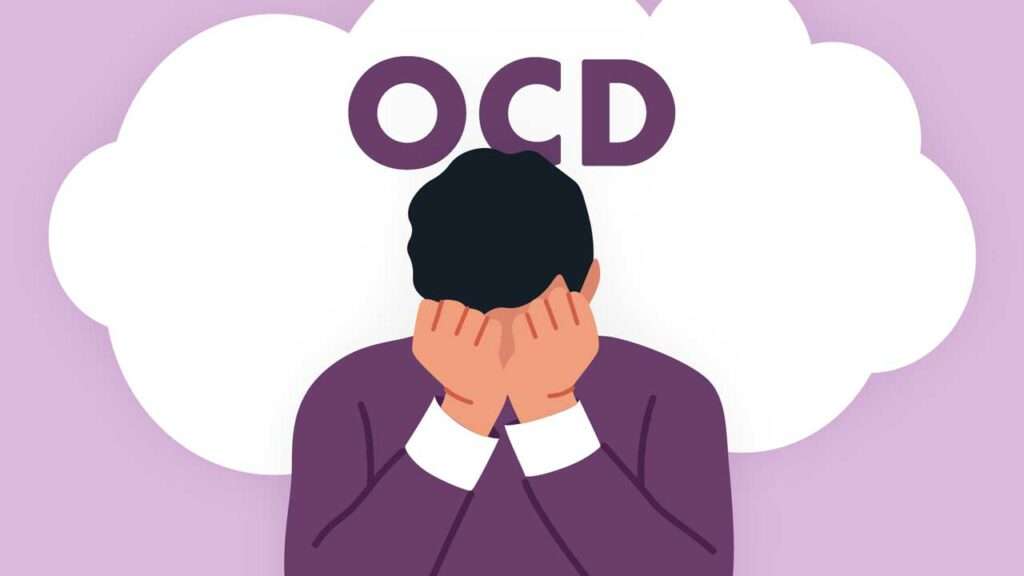Obsessive-compulsive disorder (OCD) is a mental health disorder that causes unwanted and intrusive thoughts, images, or urges (obsessions) that lead to repetitive behaviors (compulsions). These obsessions and compulsions can be time-consuming and interfere with daily activities.
What Is OCD Full Form?



OCD stands for “Obsessive-Compulsive Disorder.” It is a mental health condition characterized by recurring obsessions (persistent and intrusive thoughts, images, or impulses) and/or compulsions (repetitive behaviors or mental acts performed in response to the obsessions). People with OCD often feel a strong need to engage in these compulsions to alleviate their anxiety or prevent a feared outcome, even though they may recognize that their obsessions and compulsions are excessive or irrational.
Symptoms Of OCD
Symptom | Description |
|---|---|
| Obsessions | Unwanted and intrusive thoughts, images, or urges that can be distressing or disturbing. |
| Compulsions | Repetitive behaviors that people with OCD feel the need to do in response to their obsessions. |
| Checking | Repeatedly checking things to make sure they are done correctly or to make sure that something bad will not happen. |
| Counting | Counting things repeatedly. |
| Ordering | Arranging things in a specific way. |
| Hoarding | Collecting and saving items that have little or no value. |
| Rumination | Thinking about the same thoughts over and over again. |
| Mental compulsions | Compulsions that are performed mentally, such as counting to a certain number or repeating a phrase in your head. |
What is the root cause of OCD?
The cause of OCD is not fully understood, but it is thought to be a combination of genetic, environmental, and neurological factors.
- Genetic factors: OCD appears to run in families, suggesting that there may be a genetic component to the disorder. However, the specific genes involved have not yet been identified.
- Environmental factors: Some environmental factors that may be linked to OCD include:
- Childhood trauma: Some people with OCD report having experienced childhood trauma, such as abuse or neglect. However, it is not clear whether trauma causes OCD or whether people with OCD are more likely to experience trauma.
- Stress: Stress can trigger OCD symptoms in people who are already prone to the disorder.
- Neurological factors: OCD is thought to involve abnormalities in certain brain areas, including the orbitofrontal cortex, the cingulate cortex, and the basal ganglia. These areas are involved in processing emotions, decision-making, and movement.
It is likely that OCD is caused by a combination of genetic, environmental, and neurological factors. More research is needed to understand the exact causes of OCD and to develop better treatments for the disorder.
Here are some additional information about the causes of OCD:
- OCD is not caused by bad parenting or by anything that the person with OCD has done.
- OCD is not a sign of weakness or a lack of willpower.
- OCD is a real and serious disorder that can be very debilitating.
How is OCD identified?
There is no single test for OCD, but a doctor or mental health professional can diagnose the disorder based on your symptoms, medical history, and a mental health assessment. The diagnostic criteria for OCD are set by the American Psychiatric Association (APA) in the Diagnostic and Statistical Manual of Mental Disorders (DSM-5). The DSM-5 defines OCD as a mental disorder that is characterized by the following:
- Obsessions: Unwanted and intrusive thoughts, images, or urges that are distressing or disturbing.
- Compulsions: Repetitive behaviors that people with OCD feel the need to do in response to their obsessions.
- The obsessions and compulsions cause significant distress or impairment in social, occupational, or other important areas of functioning.
- The obsessions and compulsions are not better explained by the symptoms of another mental disorder, such as schizophrenia or body dysmorphic disorder.
Here are some additional information about how OCD is identified:
- The doctor or mental health professional will ask you about your symptoms and medical history.
- They may also ask you to complete a questionnaire about your symptoms.
- The doctor or mental health professional may also conduct a mental health assessment, which is a series of tests that can help to diagnose mental health disorders.
What is the treatment for OCD?
- Diagnosis: Talk to a doctor or mental health professional about your symptoms and medical history.
- Treatment plan: Develop a treatment plan with your doctor or mental health professional. This may include therapy, medication, or a combination of both.
- Therapy: Cognitive-behavioral therapy (CBT) and exposure and response prevention (ERP) are two types of therapy that are used to treat OCD.
- Medication: Selective serotonin reuptake inhibitors (SSRIs) are the most commonly prescribed medications for OCD.
- Support: Having support from family and friends can help you stay motivated and cope with the challenges of OCD.
Frequently Asked Question
OCD stands for Obsessive-Compulsive Disorder. It is a mental health disorder that causes unwanted and intrusive thoughts, images, or urges (obsessions) that lead to repetitive behaviors (compulsions). These obsessions and compulsions can be time-consuming and interfere with daily activities.
There is no single test for OCD, but a doctor or mental health professional can diagnose the disorder based on your symptoms, medical history, and a mental health assessment.
The cause of OCD is not fully understood, but it is thought to be a combination of genetic, environmental, and neurological factors.
Yes, OCD is a serious disorder that can have a significant impact on a person’s life. However, OCD is a treatable disorder, and with the right treatment, people with OCD can live full and productive lives.
Conclusion
OCD stands for Obsessive-Compulsive Disorder. It is a mental health disorder that causes unwanted and intrusive thoughts, images, or urges (obsessions) that lead to repetitive behaviors (compulsions). These obsessions and compulsions can be time-consuming and interfere with daily activities.






